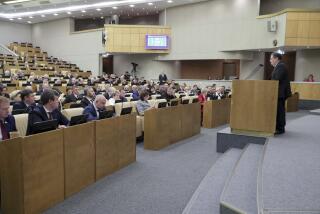Soviets Vow to Keep Pace in Arms Spending
- Share via
MOSCOW — The Supreme Soviet, the Soviet Union’s nominal parliament, opened its fall session Monday with a vow to keep pace with the United States in military spending and a call for more innovative management and better quality control of consumer products.
The session, expected to last three days, also discussed the 1987 budget and a draft of a law allowing formation of small free-enterprise, family-run businesses--a break with the traditional taboo on such enterprises.
Soviet Defense Minister Sergei I. Sokolov, appearing in good health, attended the opening session of the 1,500-member body. Sokolov, 75, missed the Nov. 7 observances marking the 69th anniversary of the Bolshevik Revolution, and he had been reported ill.
Finance Minister Boris I. Gostev said the 1987 budget called for revenues of $609.7 billion and expenditures of $609.4 billion--giving the state a small surplus and basically a balanced budget.
He said the 1987 budget allocated $28.3 billion to defense, but Western diplomats said the figure is meaningless because most of the defense budget is buried within other sectors of the economy, such as heavy-machine building.
Defense Spending Increase
Gostev said that the defense spending level, up 5.9%, is necessary because of “actions of the United States aimed at military superiority.” However, he reported that the defense budget remains at the current level of 4.6% of total spending.
Nikolai V. Talyzin, chairman of the Central Planning Committee, said the Soviet equivalent of gross national product rose 4.3% in the first 10 months of 1986, and the 1987 budget calls for a rise of 4.1%.
Industrial production is projected to rise 4.4% in 1987, the second year of the 12th five-year plan.
Talyzin said 1987 would see better quality goods for the Soviet consumer. “Each enterprise will have to pay for the poor quality of production,” he said.
He said managers will be given freer reign to hire and fire workers, and wages and bonuses will be more closely tied to productivity.
More to Read
Sign up for Essential California
The most important California stories and recommendations in your inbox every morning.
You may occasionally receive promotional content from the Los Angeles Times.












